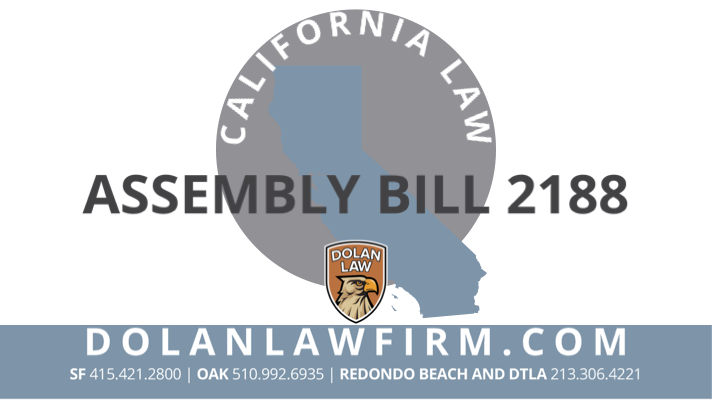Written By Chris Dolan and Vanessa Deniston
This week’s question comes from Elaina, from San Mateo, CA, who asks: I am a regular recreational marijuana smoker. It reduces my anxiety, and I believe it would help me greatly when things get stressful at work. I don’t have a doctor’s authorization for medicinal marijuana, but I know it would improve my mindset and quality of work overall. I would like to start smoking small amounts before my morning work shift to reduce my anxiety, which is always worse at the beginning of the day. My employer does do drug testing, and I’m concerned about testing positive for marijuana if there is a random drug test ordered. Can I be fired for something like this? Where does California draw the line?
Dear Elaina,
Currently, employers are well within their rights to create drug-free work policies that encompass cannabis usage and prohibit the possession or use of marijuana during work hours. Off-duty marijuana use, however, where the effects of such usage extend into working hours, presents several interesting legal issues. On January 1, 2024, a new law went into effect related to cannabis use and drug testing that affects California employers and employees.
Assembly Bill 2188 (AB 2188), which went into effect at the turn of the year, addresses several circumstances under which it is now unlawful for an employer to discriminate against individuals in hiring or during employment with respect to cannabis use.
Off-Duty, Off-Site Marijuana Usage
The first part of AB 2188 amends California’s Fair Employment and Housing Act (FEHA) to protect employee’s off-duty, off-site cannabis use, prohibiting an employer from discriminating against an employee for off-duty use. AB 2188 provides three important exceptions to this.
- First, these protections do not apply to those working in the building or construction trades. This makes considerable sense as employees in these trades are often in situations where they are at a higher risk of physical safety injury (i.e., climbing up ladders, standing on the roof of a building, operating heavy machinery), thereby necessitating more comprehensive safety precautions than the average job environment.
- Second, AB 2188 does not apply to employees hired for positions that require federal background investigations or security clearances.
- Finally, it does not override any state or federal laws that require testing job applicants or employees for controlled substances.
Drug Testing Results Finding Nonpsychoactive Cannabis Metabolites
The second part of AB 2188 prohibits discrimination against a drug-screened employee, where the test results reveal only nonpsychoactive cannabis metabolites in their system, as opposed to psychoactive cannabis metabolites. Thus, if an employee tests positive for marijuana during a drug screen but the testing reveals no traces of psychoactive metabolites, the employer cannot use the positive test as the basis for disciplining or terminating the employee or refusing to hire the employee. Indeed, nonpsychoactive cannabis metabolites are stored in the body for days, weeks, or even months after cannabis use. Most traditional drug tests have screened for both nonpsychoactive and psychoactive cannabis metabolites. Hence, a positive test does not necessarily equate to an impairment finding. AB 2188 underscores that drug testing is intended to analyze impairment at work. Thus, testing for nonpsychoactive metabolites that have no effect on impairment falls outside the purpose of drug testing.
An impairment finding typically means the test has revealed high levels of THC, the primary compound in marijuana found to cause impairment. Certainly, there is a greater risk of an impairment finding if the employee consumed cannabis close in time with the test. Thus, if an employee does consume cannabis before work and an employer drug screen reveals psychoactive metabolites in the employee’s system affecting their impairment, they would not be protected under AB 2188.
It is important to note that nothing in AB 2188 prohibits an employer from drug testing their employees. Further, the law does not permit employees to possess, be impaired by, or use cannabis on the job, even if for medicinal purposes.
Suppose an employer has discriminated against an employee in violation of AB 2188. In that case, the employee can file a complaint with the California Civil Code with the California Civil Rights Division (CRD), formerly the Department of Fair Employment and Housing (DFEH), and bring an action in civil court against their employer. Forms of relief available under AB 2188 include reinstatement, back pay, future lost wages, compensatory and punitive damages, as well as interest, fees and costs, and declaratory or injunctive relief.
If you believe your employer has discriminated against you in violation of AB 2188, contact a law firm like the Dolan Law Firm and speak with an attorney to discuss the facts and circumstances of your situation to understand your rights better.










